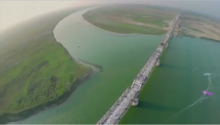Digha–Sonpur bridge
|
Digha–Sonpur rail–road bridge दीघा-सोनपुर रेल-सह-सड़क सेतु |
|
|---|---|

Digha–Sonpur Ganga rail–road bridge
|
|
| Coordinates | 25°40′05″N 85°06′30″E / 25.6681°N 85.1083°E |
| Crosses | Ganges |
| Locale | Digha–Sonpur |
| Characteristics | |
| Design | K-truss bridge |
| Total length | 4,556 metres (14,948 ft) |
| Width | 10 metres (33 ft) |
| No. of spans | 36 |
| No. of lanes | 2 |
| Rail characteristics | |
| No. of tracks | 2 |
| History | |
| Construction begin | 2003 |
| Construction end | August 2015 |
| Opened | 3 February 2016 |
| Statistics | |
| Daily traffic | 14 pair of trains |
|
|
The Digha–Sonpur rail–road bridge (Hindi: दीघा-सोनपुर रेल-सह-सड़क सेतु) or Ganga rail–road bridge (Hindi: गंगा रेल-सड़क सेतु) is a bridge across river Ganga, connecting Digha Ghat in Patna and Pahleja Ghat in Sonpur, Saran district in the Indian state of Bihar. The rail-cum-road bridge provides easy roadway and railway link between northern and southern parts of Bihar. It is a steel girder bridge. Regular scheduled passenger rail service was inaugurated on this route on 3 February 2016. This is second railway bridge in Bihar after Rajendra Setu that connects North Bihar to South Bihar. Indian railways has constructed two railway stations on either sides of the bridge – Patliputra Junction railway station (PPTA) and Bharpura PahlejaGhat railway station (PHLG).
Rajendra Setu was the only bridge that carried railway tracks across the Ganges in the state of Bihar till 3 February 2016. It was opened in 1959.
On 22 December 1996, Former Prime Minister H. D. Deve Gowda laid the foundation stone for the construction of the railway bridge over Ganga at Sonepur.Ram Vilas Paswan was the railway minister at that time, but the physical work on the bridge began in 2003 when Nitish Kumar was the railway minister. The Digha–Sonpur Ganga bridge was initially sanctioned as a rail bridge; the project was converted to a rail-cum-road bridge in 2006. Total cost of the project was put at ₹13,890 million, out of which ₹8,350 million was for the rail part, and ₹5,540 million was for the road part. It was expected to be completed in five years. The construction work on the bridge was completed in August 2015, and a trial run of a diesel locomotive was undertaken on the bridge in the same month.
...
Wikipedia
